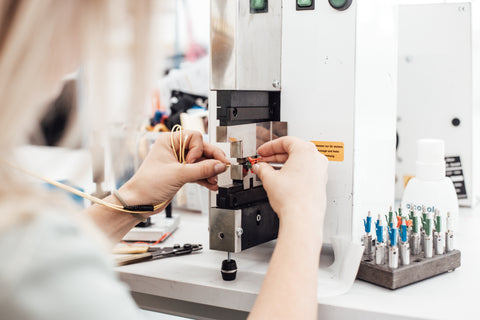Advantages of fiber optic cable vs. copper cable

For decades, copper was an affordable cable material. Thanks to its capabilities and relatively low cost, it was the go-to wiring choice for various applications. But with the growing need for fast data transmission wiring, fiber optic cables have started to become a more frequent choice. So what are the features that make it better to choose fiber optics over copper?
Benefits of fiber optic cables
Even though there are different fiber optic cable types, they offer pretty similar characteristics. But when compared to other wiring construction options, like wires made of copper, we can see how fiber optics prevail. Here are 5 reasons why fiberoptic cable is better than copper cable.
1. Cost
At first glance, it may seem that copper wiring is cheaper than fiber optics. And it is true — the cost of the wiring itself tends to be more affordable when it comes to copper. But when taking into account maintenance, installation and other costs involved in using the wire, it is actually less expensive to purchase and install fiber optics cable than copper.
Especially when considering the cost of the project, in the long run, you will end up spending more on copper than fiber optics. With this being said, it is just reasonable and cost-effective to purchase fiber optic wire in the first place.
2. Bandwidth & transmission speed
In terms of bandwidth, fiber cables provide a better feature — fiber optic HDMI can transmit up to 10 Gb per second, which is more than 1,000 times more than copper. This leads copper wiring to face a drastic signal loss as the distance increases. The reason is that copper was initially made for voice transmission, which requires a smaller bandwidth than when it comes to transmitting larger loads of data.
3. Reliability & durability
Fiber cables are extremely reliable and durable, especially when compared to copper. Because optic fiber can withstand a lot of damaging factors, such as moisture, weather conditions and temperature, they provide excellent data transmission.
At the same time, copper cables worsen their performance under the impact of these environmental factors. This means that you may not worry about installing a fiber cable outdoor.
Then, in case the wire gets damaged, the fiber to be replaced can be easily noticed and changed, and the system will keep working. In the case of copper wiring, the signal transmission will stop entirely if it’s damaged.
Besides, the fact that fiber optic HDMI cables transmit light signals as opposed to electric current plays a role in their ability to withstand electromagnetic interference, which is an issue for copper cables.
4. Less space & easier cable management
In addition to all the listed advantages, fiber optics cabling is very thin — an optic fiber is usually as thin as a human hair. And while they take so little space, they can transmit an immense amount of data. Copper, by contrast, is 4 times ticker and transmits several times fewer data.
Therefore, you can manage a fiber optic wire more easily with less space taken while getting an excellent performance.
5. Novelty
With the development of technology and a growing need for fast connection, fiber optic capabilities are going to stay in demand. So with newly occurring technologies, fiber optics are going to be the go-to choice. So you will be able to adopt the technology without getting new wiring if you already have an optic cable.
Where to buy fiber optic HDMI cable?
Nassau National Cable is a fiber optic products supplier — we have a range of fiber optic wires for different project needs:
If you need help deciding which type of fiber optic line is the right fit for your project, reach out to our team for a consultation.

















